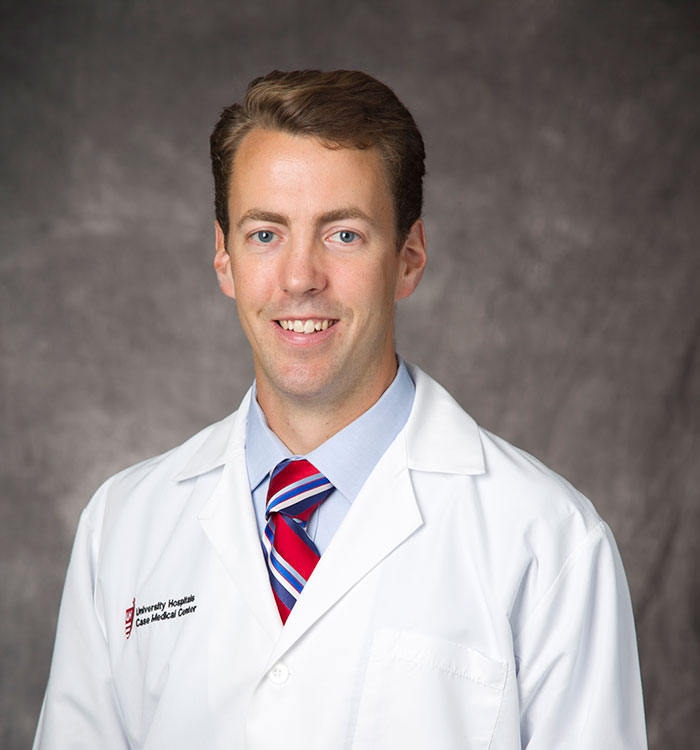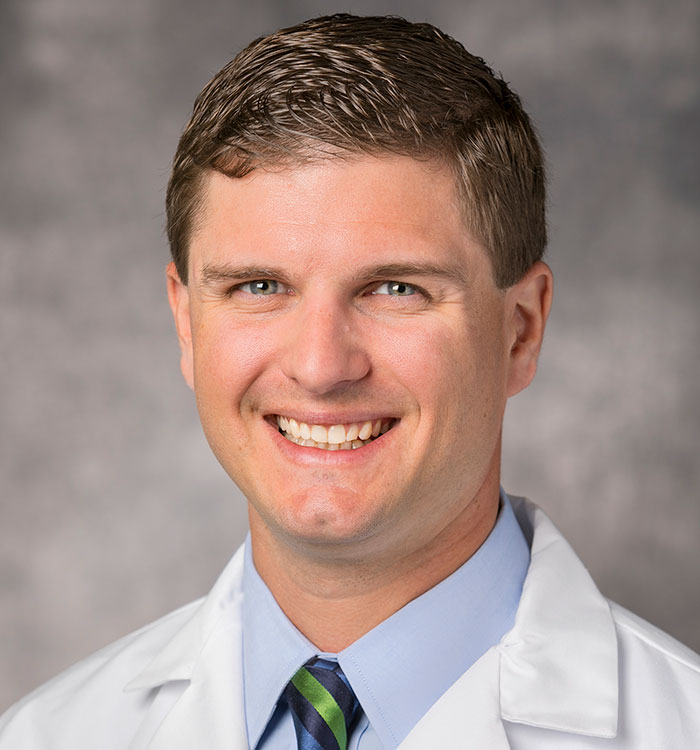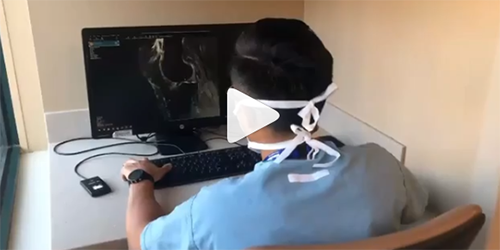Orthopedic Residency Recruitment Goes Virtual
January 04, 2021
Though driven by COVID-19, new format may become a permanent part of the recruitment process
Innovations in Orthopaedics | Winter 2021
 Robert Gillespie, MD
Robert Gillespie, MD Michael Karns, MD
Michael Karns, MDIn “normal” years, fourth-year medical students from across the United States spend about a month with the University Hospitals Department of Orthopedics team as they explore residency options. Because of COVID-19, the format of those rotations had to change — as did many other aspects of the residency recruitment process. Because of the convenience and cost advantages, the new virtual format may become a permanent part of the recruitment process.
Robert Gillespie, MD, Program Director for the UH Orthopedic Surgery Residency Program and the chief of shoulder and elbow surgery at University Hospitals Cleveland Medical Center; Michael Karns, MD, Associate Program Director and Orthopedic Sports Medicine Fellowship Associate Director for UH Cleveland Medical Center, and Kerwin Samson, Academic Program Administrator, Orthopedics, worked together to develop a 100 percent virtual recruitment process that meets the needs of potential applicants, residents and the department itself.
“For nearly 50 years, we’ve invited students to visit Cleveland to experience all our department and UH have to offer,” Dr. Gillespie says. “Fairly quickly we had to redesign the recruitment program so we could continue to recruit the best and the brightest while also meeting safety requirements. By listening to the advice of our residents and using an interview scheduling platform, we found a way to optimize our recruitment process.”
PARTNERING FOR SUCCESS
As an alternative to in-person rotations, fourth-year medical students participate in a buddy system. Students pair up with residents who walk them through the residency program. Students can ask questions and otherwise communicate with residents by video, phone, text and email.
“The virtual buddy system provides a way for applicants to get to know us, and for us to know them,” Dr. Gillespie says. “In addition to support from the orthopedic surgery faculty, this program depends on resident input. They have a huge say in who we recruit for our next class of orthopedic interns.”
In addition to redefining UH’s Orthopedic Residency recruitment process, Dr. Gillespie and Dr. Karns helped define the virtual orthopaedic residency interview season on a national level. Both participated as panelists in a Town Hall hosted by the American Orthopaedic Association's Council of Orthopaedic Residency Directors (CORD).
 UH Orthopaedic residents show fourth-year medical students a day in the life of graduate medical education at UH - watch now on IG @UHortho.
UH Orthopaedic residents show fourth-year medical students a day in the life of graduate medical education at UH - watch now on IG @UHortho.“The panel discussion helped give consensus to what these virtual processes would look like,” Dr. Karns says. “Out of it came sets of guidelines for residencies and rotations not only in Cleveland, but at other major orthopedic programs across the country.”
The UH Orthopedic Residency Program completed the first round of interviews in mid-November, interviewing Case Western Reserve University School of Medicine and Cleveland Clinic Lerner College of Medicine fourth-year medical students. The program holds its standard match day later in March.
“That’s no different this year,” Dr. Karns says. “We’re going to rank our top candidates; applicants rank their top programs; and we hope to get our top six candidates, knowing there are a lot of unknowns because we haven’t met some of them in person.”
USING TECHNOLOGY TO THE FULLEST
While Dr. Gillespie and Dr. Karns lead the program, Samson makes it happen. She oversees all aspects of the residency program, including interview day. This year, they moved interviews to the Thalamus interview scheduling platform.
Thalamus implementation took time (Samson jokes she kept the UH IT help desk on standby), but she troubleshot and solved problems before any appointments took place. She’s now developed a Thalamus instructional video for faculty.
“Our transition from live to virtual couldn't have been done without Kerwin and her ability to navigate the platform, as well as setting up Thalamus,” Dr. Gillespie says.
With the reinvention of the recruitment process, UH’s Orthopedic Residency education program is now almost entirely virtual. Grand rounds, didactic sessions and other academic meetings all happen virtually on Zoom. When restrictions around COVID-19 loosen in the future, many of these elements may remain virtual.
“Taking the recruitment virtual leads to huge cost savings for students and residency programs,” Dr. Karns says. “We eliminate the cost of hosting students and they save on travel costs. If successful, we envision this process may continue to some extent even when the country goes back to normal.”
Making dramatic changes to an established program and processes is a major undertaking. Leadership support was crucial to its success.
“Dr. James Voos, our department chair, gives us the ability and tools to successfully recruit and train future orthopedic surgeons,” Dr. Gillespie says. “Because of support from him and hospital leadership, as well as program leadership from Kerwin, we’ve been able to make innovative changes that others may view as outside the status quo.”
For information about the UH Orthopaedic Residency Program, call 216-844-3233.


